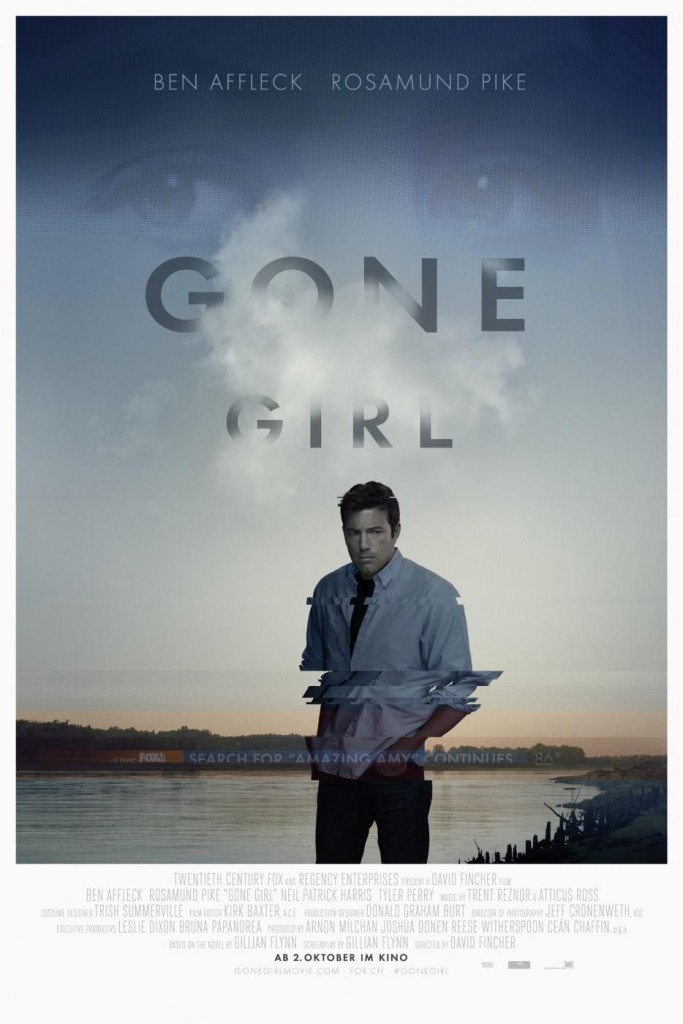Movie Breakdown: Gone Girl (Noah)
People are doing traditional-style reviews all over the web, so we decided to try something different. In each “breakdown” we’ll take a look at what a film’s marketing led us to believe, how the movie actually played, and then what we learned from it all. Read on!
The Impression:
It’s a new David Fincher film folks, what else is there to say? I’d watch this guy’s film if it was just two and a half hours of shadows creeping across a wall.
The Reality:
Gone Girl, much like the book it was adapted from, is a deeply fucked up film. The story of Nick Dunne (Ben Affleck) and his disappeared wife Amy (Rosamund Pike) feels like a Douglas Sirk film as seen through the clear eyes of a certified sociopath. The film, for the most part, begins with Nick discovering that his wife has disappeared, leaving a healthy amount of blood and a series of anniversary clues. The next two and half hours is his dark journey from bewildered husband to suspect to something far deeper and far darker. Affleck makes a fine showing as Nick, a man who’s breached the unhappiness of his own marriage and now must navigate the twists and turns of his wife’s disappearance, but the juiciest, most deliriously insane bits fall squarely on the shoulders of Rosamund Pike’s Amy. Fincher has always been a director who plays with the idea of women and the way they effect men (Marla in Fight Club, Lisbeth in Girl With A Dragon Tattoo) but Amy Dunne is his greatest example. The director exposes the most stereotypical of perceived female weakness and the way our society feeds on these stereotypes and then flips them around, and uses them as a chest of weapons for Amy to use against the world. Though I always enjoy every movie Fincher makes, it feels as in some of his last few attempts (The Curious Case of Benjamin Button and Girl With The Dragon Tattoo the most prime examples) he’s leaned heavily on his visual acumen and the talents of his actors to make smooth, seamless films that look good, watch better, but never directly challenge the viewer. Gone Girl, as adapted by the author of the book Gillian Flynn, is not that movie. Though it plays in the sandbox of domestic squabble, seedy crime, and seedier revenge flicks, this is a dense, captivating movie, that ends on the kind of moral question mark we haven’t seen from Fincher in a while. This is not my favorite Fincher film, far from it, but as I’ve said before, Fincher’s cold, calculating visual prowess and his ability to craft movies just on the periphery of your standard Hollywood potboiler makes it as enjoyable as anything I’ve seen this year. Yes, the film drags, and at times I wondered at the narrative pace and the way the director decided to unveil certain clues, but issues aside, I found myself invested in these characters and this story on an intellectual level. It’s dark and crazy and no one is left unscathed when the credits roll, but beneath the seedy layer of heat and emotion, Fincher has crafted a movie that asks what is happiness and what exactly are we willing to do to achieve it. It might not be Fight Club, but it’s a movie ripe for discussion, and that’s my favorite kind of Fincher.
The Lesson:
Does this mean we have to wait another year or two before Fincher drops another bombshell on us? Fuckity fuck fuck.


